If you’re reading this, you’re probably facing the same challenge thousands of tech leaders confront daily: finding competent developers who deliver results without draining your budget or sanity.
As someone who’s spent years hiring technical talent, I’ve watched the freelance developer marketplace shift. The two giants in this space—Toptal and Upwork—continue to dominate conversations. But the reality of working with these platforms often differs from their marketing claims.
This comparison draws from our firsthand experience with both platforms. My team and I have gone through the entire hiring process on Toptal and Upwork, surveyed their users, and collected insights to understand where each platform truly excels and where alternatives like Lemon.io might better serve specific needs.
By the end of this article, you’ll understand:
- The true quality difference between Toptal and Upwork developers
- What you’ll pay (including hidden costs and platform cuts)
- Which platform better suits different project types
- The real-time investment required for each
- How Lemon.io offers a compelling alternative that addresses key pain points
Let’s explore what each platform does well, where they struggle, and how to choose the right fit for your specific situation.
Our Research Approach: Beyond Marketing Claims
Before diving into comparisons, let me be transparent about our methodology. We didn’t want to regurgitate information from both platforms’ websites or rely on outdated reviews.
Instead, we:
- Went through the entire client signup process on both platforms
- Interviewed businesses that had hired through either Toptal or Upwork in the past year
- Analyzed recent user reviews from multiple sources
- Spoke with developers who work on these platforms to get the talent-side perspective
- Documented the complete journey from initial contact to developer selection
This hands-on approach revealed insights that wouldn’t be apparent from marketing materials alone. Throughout this article, I’ll share these discoveries so you can make a truly informed decision.
Platform Overview: First Impressions Matter
Toptal: The Premium Talent Marketplace
Toptal positions itself as the solution for businesses seeking elite development talent. Its primary claim—that it accepts only the “top 3%” of freelance talent—sets high expectations from the start.
Upon registration, Toptal showcases a polished, enterprise-focused experience. The platform requires billing details upfront (to verify you’re a legitimate business) and remembers your profile information even without setting a password.
What struck me during our research was that Toptal immediately presented three developer profiles after registration, though surprisingly, these were mismatched to our stated requirements. Despite specifying React Native, React, and JavaScript needs, two of the three suggested developers had limited mobile expertise.
Upwork: The Massive Talent Marketplace
Upwork takes a fundamentally different approach, presenting itself as a comprehensive freelance marketplace with millions of professionals across countless categories.
The initial experience feels more self-directed than Toptal. You’ll create a job posting, review applications from interested freelancers, and manage the hiring process yourself.
Upwork has an AI helper for composing project descriptions, but it’s a bit clumsy. After the AI pre-fill, I had to refine the project form a lot. After posting a job, I received a lot of irrelevant proposals.
Comprehensive Comparison: What Really Matters
Toptal’s Developer Quality
The “top 3%” claim is Toptal’s primary selling point, but does it hold up? Based on our research, the answer is nuanced.
Toptal’s vetting process is indeed rigorous. Developers report going through 5-6 interview stages, with some mentioning up to 12 interviews over six months.
The process includes:
- Screening for communication skills and personality
- Domain-specific knowledge assessment
- Technical coding challenges and live problem-solving sessions
- Portfolio reviews
- Test project completion to demonstrate proficiency
- Multiple interviews with senior Toptal domain experts
On the client side, many startups report positive experiences with Toptal’s talent quality. As one founder noted:
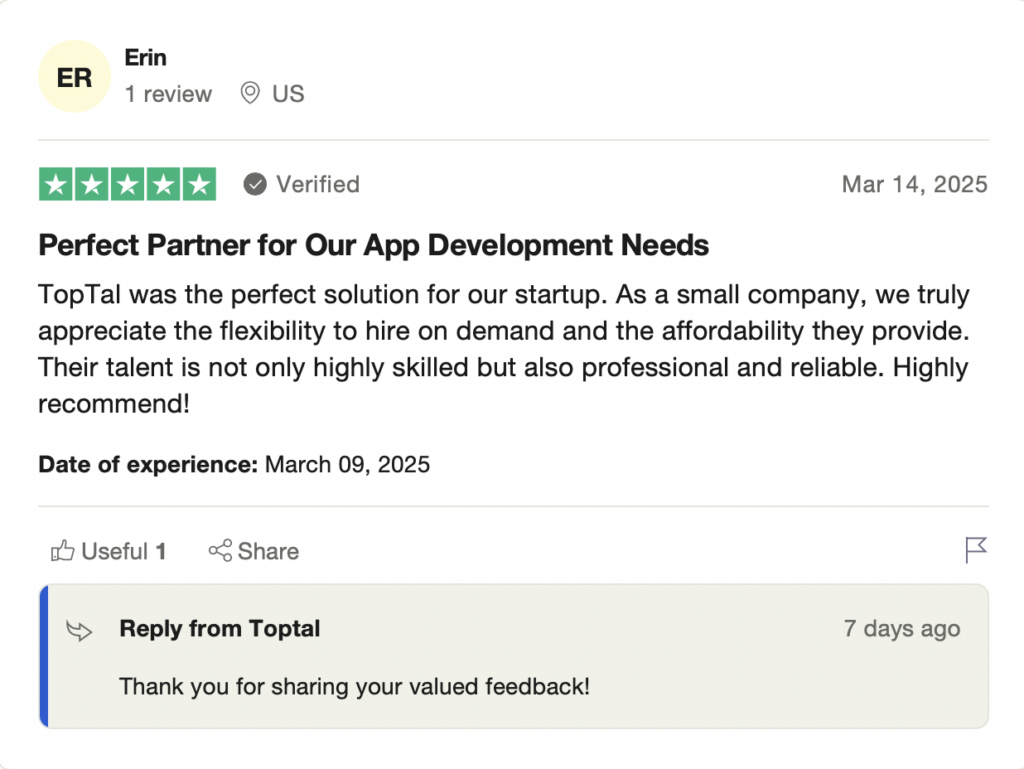
However, not all experiences are positive. During our testing, we found that Toptal’s matching algorithm sometimes suggested developers with skills that didn’t precisely match our requirements. However, these aren’t your final options. After your consultation call, Toptal representatives manually curate your candidate list—so don’t judge the service by its automated first impressions alone.
Several clients have also voiced serious concerns regarding the quality of talent on Toptal. One dissatisfied customer shared:
Their so-called ‘vetting process’ is a complete joke. They claim to have the ‘top 3%’ of freelancers, but what they really have are overpriced, underqualified contractors who are no better than what you’d find on Fiverr or Upwork for a fraction of the price. The developer I was matched with missed deadlines, delivered garbage work, and constantly made excuses.
However, an insider perspective from a Toptal employee offers a more nuanced view:
Most talent on the site is exceptional. But bad apples happen. It isn’t common, but definitely do your best to interview your candidates and ask technical questions if you can. If you do find yourself unhappy with the recruit, the matcher will help you and I’ve seen clients get away without needing to pay for misrepresentation of skills.
This range of experiences highlights an important reality: even with Toptal’s rigorous screening process, client-developer fit remains somewhat subjective. Their vetting identifies technically proficient developers, but project success depends on factors beyond technical skills alone.
Upwork’s Developer Quality
Upwork’s open marketplace approach results in highly variable quality. There’s no standardized vetting process beyond basic identity verification, placing the burden of screening on clients.
A long-time Upwork client expressed frustration:
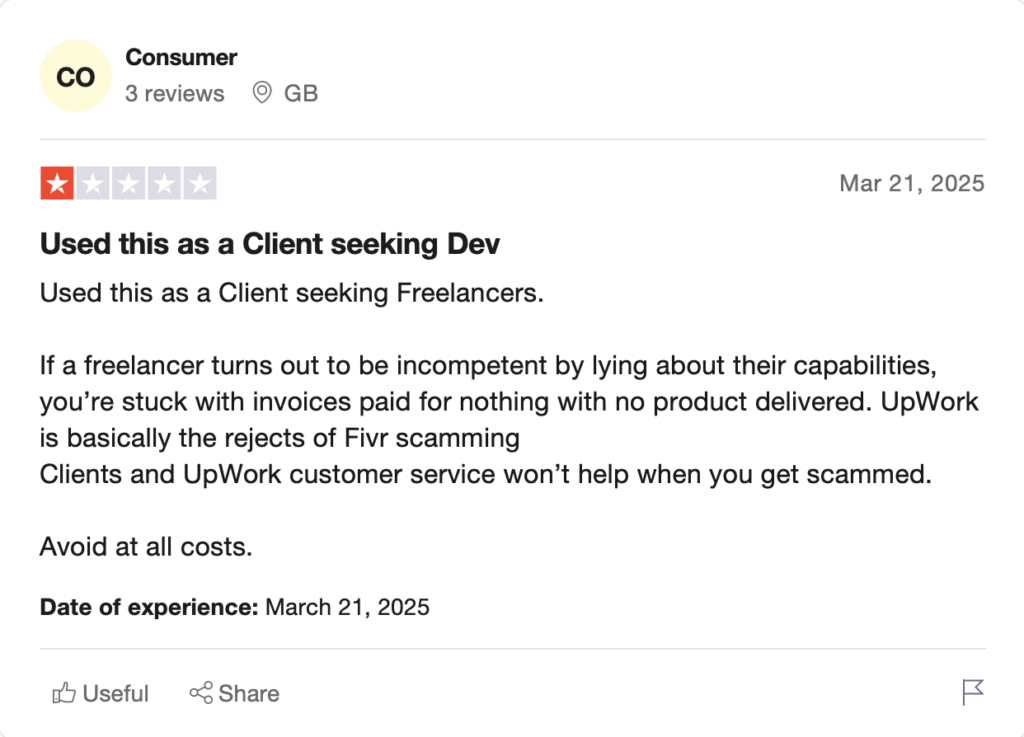
This sentiment appears frequently in recent reviews, suggesting quality control has become a growing challenge on the platform.
Interestingly, when reviewing recent Upwork testimonials, we found a notable pattern: Most positive reviews (four and five stars) came almost exclusively from freelancers using the platform to find work, rather than from clients hiring talent. One glance at Upwork’s Trustpilot ratings tells the real story:

That’s not a typo—90% one-star reviews. When the rare positive reviews come almost exclusively from freelancers rather than clients, you know something’s fundamentally broken. This imbalance further suggests that while Upwork may serve freelancers well, client satisfaction often lags behind.
Toptal’s Pricing Model
During our research, Toptal representatives shared the following pricing information:
- Front-end developers with React/JavaScript skills typically charge $65-100/hour
- More specialized developers can command $80-200+/hour
- A $500 deposit is required for the trial period (refundable if you don’t hire)
The same Toptal employee confirmed this commission structure, stating:
“If you are paying $95/hr, your hiree is getting $60-65/hr. They may or may not be aware of this.”
However, there’s an additional cost not widely advertised: Toptal requires a subscription fee of $79 per month access to its talent network. This fee is mandatory as long as you use the platform, creating an ongoing expense regardless of whether you’re actively hiring.
Toptal operates with a commission structure. Multiple sources state Toptal takes around 30-50% of what clients pay, with the remainder going to developers. This revenue model funds their thorough vetting process and white-glove matching service—essentially, you’re paying for Toptal’s expertise in finding the right talent, not just the developer’s time.
The Toptal source also mentioned that “talent IS NOT supposed to discuss wage with you, and there are huge consequences for trying to pull business away from Toptal.”
This approach to client-developer relationships is standard for many talent platforms seeking to protect their business model, though it does create some information asymmetry in the marketplace.
Upwork’s Pricing Model
Upwork’s pricing structure is more flexible but also straightforward:
- Freelancer rates range from $10 to $150+/hour
- Clients pay a Marketplace fee of up to 7.99% on all freelancer payments
- Freelancers pay a flat 10% fee on all contracts
The lower end of this spectrum raises quality concerns. As one freelancer observed: “Clients on Upwork usually look for cheaper freelancers.” This creates a race to the bottom that can compromise quality.
Our verdict: Toptal commands premium rates that reflect their intensive vetting process and matching services. Upwork offers more flexible pricing options but requires careful attention to avoid quality issues with lower-priced talent.
Toptal’s Hiring Process
Toptal operates on a two-call system:
- An initial 15-minute consultation with a Toptal representative
- A follow-up call with a domain expert to discuss technical requirements
The Toptal employee clarified the matching process in more detail:
You will meet with a matcher who will ask you about your project and what you need in a hiree. That matcher then posts a job and people will apply. Then the matcher will select who they think are the best applicants and present them to you. You then review their application/profile and choose whether you want to interview them or not.
After the initial call, the account setup process includes:
- Password creation
- Verification of pre-filled information
- Providing billing address and credit card details
- Agreeing to charges that will occur after the call with the director
- Scheduling the second call
- Signing a Sourced Talent Agreement via DocuSign
Once completed, Toptal matches you with developers they deem appropriate for your project. The entire process typically takes 1-2 weeks from initial contact to developer selection.
Upwork’s Hiring Process
Upwork’s self-service approach follows these general steps:
- Create and post a job
- Review proposals from interested freelancers
- Interview candidates
- Make a hiring decision
- Fund the project milestone or hourly contract
This process takes anywhere from 24 hours to several weeks, depending on how quickly you move and how selectively you screen candidates.
Our verdict: Toptal provides a more managed experience but with less control. Upwork offers direct control but requires significantly more time investment. Toptal’s process generally moves faster if you’re satisfied with their suggestions.
Toptal’s Platform Experience
Toptal’s interface is clean and enterprise-focused, but somewhat rigid in its workflow. The platform emphasizes its matching process rather than giving clients direct access to browse all available talent.
Users appreciate Toptal’s hands-on approach to project matching.
Toptal’s interface is refreshingly simple—no bells and whistles, just practical functionality. As this client notes:
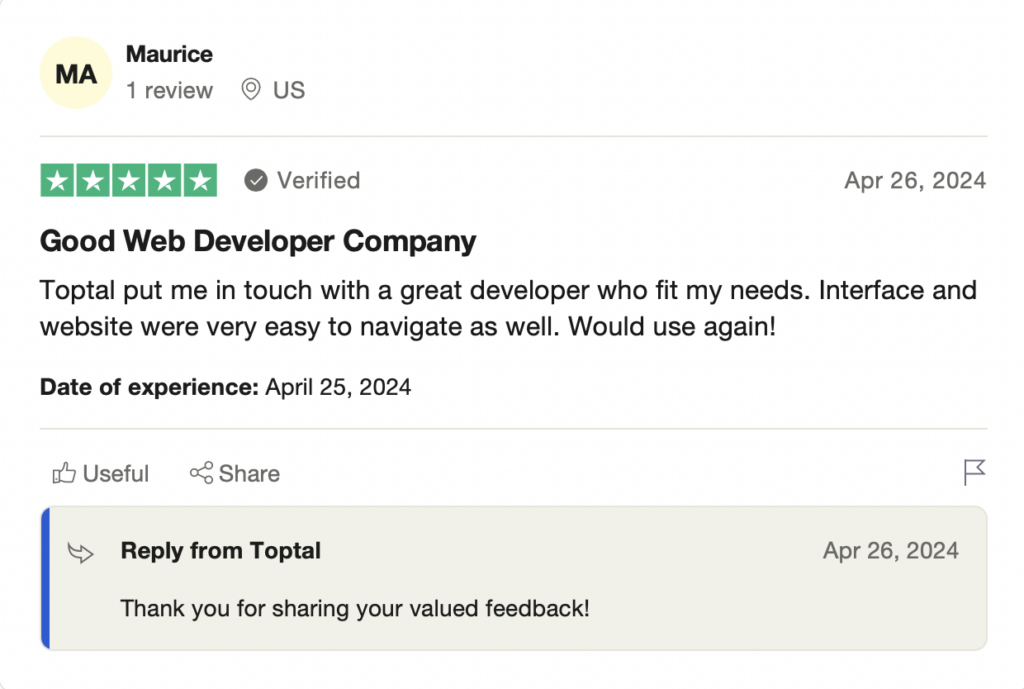
Upwork’s Platform Experience
Upwork’s interface offers considerable flexibility and extensive filtering options. Clients can browse profiles, compare proposals, and manage projects directly. The platform includes time tracking, milestone setting, and secure payment processing.
However, the abundance of features can sometimes feel overwhelming, especially for first-time users. The volume of proposals often requires significant time to sort through.
Our verdict: Toptal offers a more streamlined but rigid experience. Upwork provides more flexibility and features but can feel overwhelming and time-consuming.
Toptal’s Quality Guarantees
Toptal emphasizes its “no-risk trial period”:
- Requires a $500 upfront deposit
- If you’re unsatisfied with a developer, you can try up to three different developers
- If still unsatisfied, you can request a refund
This approach provides some peace of mind, but the deposit may deter some smaller businesses.
It’s worth noting that client experiences with the trial period can vary. Here’s what one customer reported:
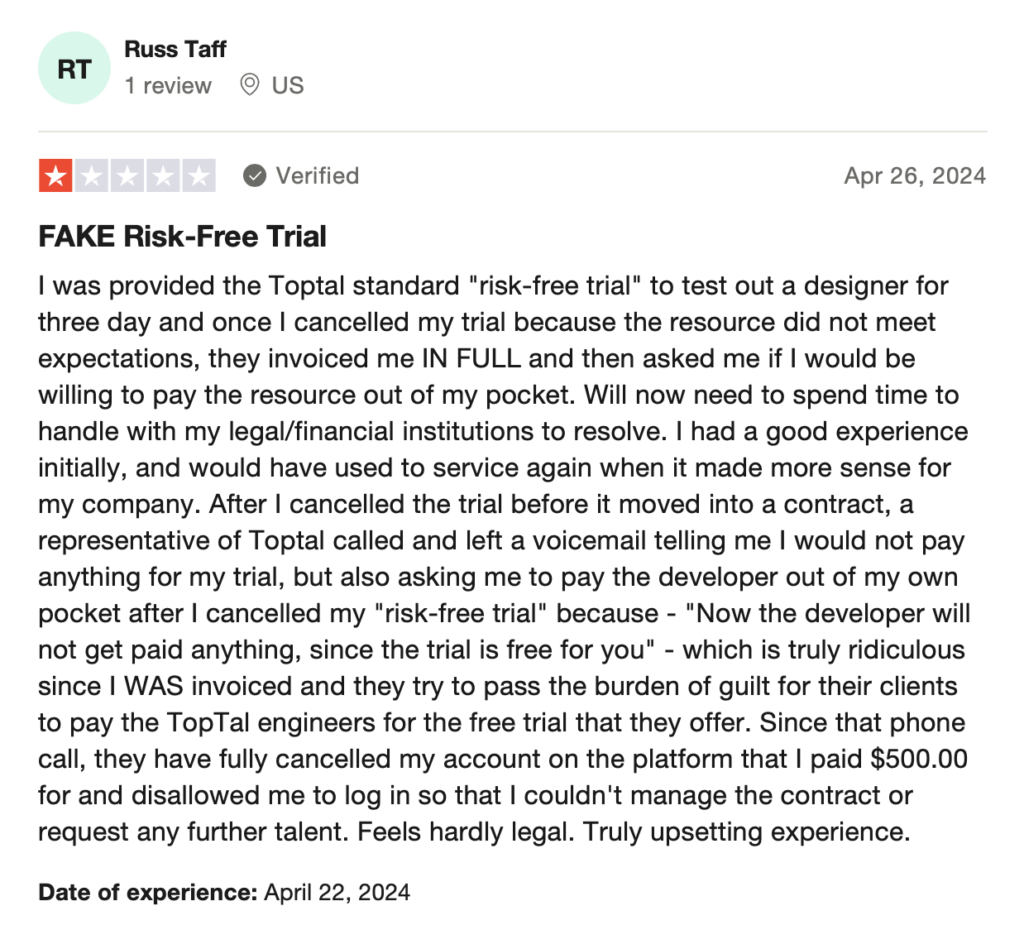
This suggests that clients should carefully review the fine print of Toptal’s trial period terms before committing.
Upwork’s Protection Mechanisms
Upwork offers different protection mechanisms:
- Hourly contracts are protected by Upwork’s Work Diary, which takes screenshots of freelancers’ screens.
- Fixed-price contracts use a milestone system where funds are held in escrow until work is approved.
- A dispute resolution system exists, though many users report mixed experiences with its effectiveness.
Despite these safeguards, we found numerous accounts of clients feeling unprotected when things go wrong. One client’s experience was very telling:
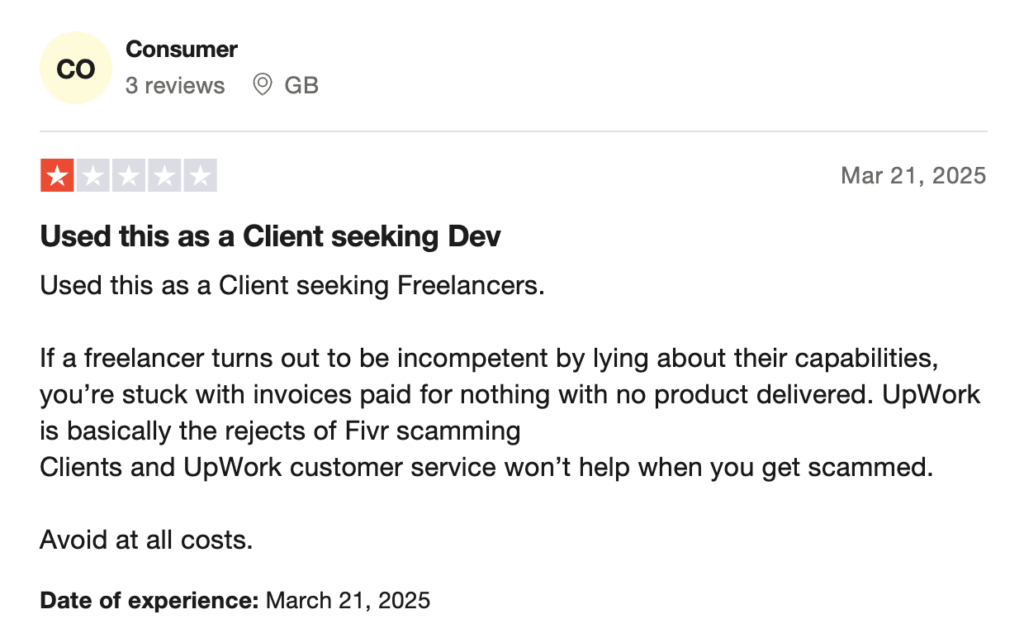
This reveals a fundamental challenge in Upwork’s model: While technical mechanisms exist to track work, they don’t necessarily guarantee quality or protect against skill misrepresentation.
Our verdict: Both platforms have room for improvement in client protection. Toptal’s “risk-free trial” has limitations in practice, with some clients reporting difficulties with cancellation processes, while Upwork’s technical safeguards don’t fully address quality assurance.
Common Challenges & Pitfalls
Our research showed several consistent pain points reported by users of both platforms. Understanding these challenges can help you navigate potential issues.
Agency Misrepresentation
One significant issue that’s prevalent on Upwork is agencies posing as individual freelancers.
This creates a bait-and-switch scenario where the person you interview isn’t the one who’ll actually work on your project.And if you’ve been on Upwork lately, you’ve probably noticed something odd: agencies have multiplied like rabbits. Even veteran Upwork clients are scratching their heads:
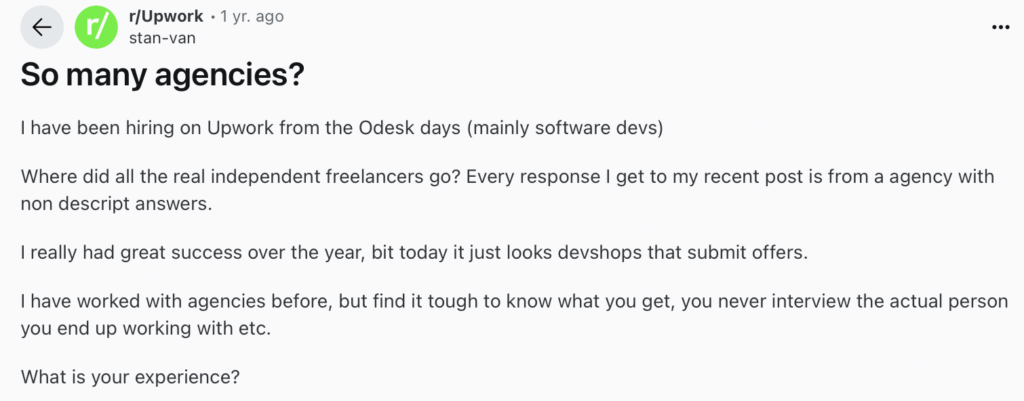
Review Manipulation
Upwork has a concerning feature that undermines its entire review system: “Top Rated” freelancers can remove one negative review every three months.
When this happens, the review simply disappears, replaced with a bland “This feedback has been removed” message. One client noticed this pattern after repeatedly hiring seemingly perfect candidates:
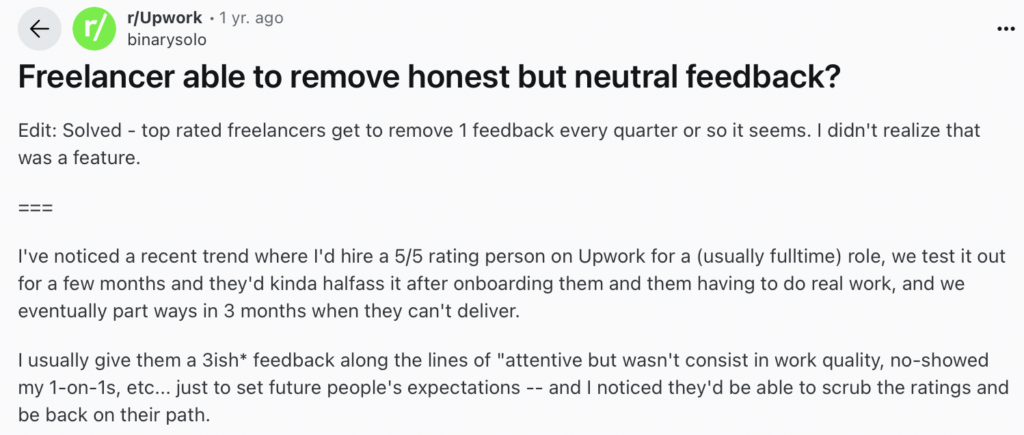
This creates a troubling dynamic where long-term work quality becomes almost impossible to verify. The savviest clients have developed workarounds, like checking for patterns of scrubbed reviews on longer projects. But most businesses don’t have time to play detective with every hire.
Project Completion Reliability
Unexpected project abandonment is a recurring theme in user feedback:
I hired a dev on Upwork to build this out for me and he has done great work (I think), but he started a new job recently and doesn’t have the time to assist with it moving forward. I even offered to double his $80/hr rate but it’s not worth it for him…
This was actually the first time I had a good experience with Upwork but I’m afraid of hiring someone else and them not being as skilled or knowledgeable with everything he has done so far.
This experience highlights the reality that freelancers may prioritize better opportunities, leaving existing projects in limbo.
Communication Breakdowns
Time zone differences and cultural barriers can create significant communication challenges. Many users report frustration with delayed responses, misunderstandings, and language barriers. During our research, we observed several instances where:
- Developers would promise unrealistic timelines to secure contracts
- Clients struggled with developers who were technically skilled but had poor communication habits
- Asynchronous communication led to days of delays for simple questions
- Non-native English speakers faced challenges explaining technical concepts, despite being skilled developers
As one frustrated client told us: “I spent more time trying to explain what I needed than it would have taken me to do the work myself. It wasn’t a coding issue—the developer was talented—but we just couldn’t get on the same page.”
Poor English skills can turn simple project discussions into time-consuming nightmares. Even brilliant developers struggle when they can’t articulate technical concepts clearly or ask the right questions. What should be quick clarifications become day-long email chains, especially across time zones. The result? Projects stall while everyone drowns in miscommunication.
Time Zone Challenges
While remote work has become standard, managing global teams remains challenging:
Consider a US-based startup working with a developer in Southeast Asia. When critical bugs need immediate attention, the 12-hour time difference means someone’s always working outside normal hours. The product manager either joins calls at 6 a.m., or the developer stays up until midnight. Quick fixes stretch into day-long delays, and routine problems become scheduling headaches.
Some users report that Toptal attempts to account for time zone preferences. Upwork allows filtering by time zone, but this reduces your available talent pool.
Best-Fit Scenarios: How to Choose the Best Platform
After extensive research and user interviews, we’ve developed a framework to help you decide which platform might work best for your specific needs:
When Toptal Makes Sense
Choose Toptal if:
- You can’t risk hiring the wrong developer. When a bad hire could tank your product launch or compromise user data, Toptal’s vetting process provides more safety than Upwork’s open marketplace. Its 5-12 interview process at least weeds out developers who can’t code.
- You lack technical screening ability. No technical co-founder or senior developer to evaluate candidates? Toptal’s screening becomes your filter. Yes, you’ll pay a premium, but it beats discovering your new hire doesn’t understand basic architecture—after they’ve built your core product.
- You’re building something complex. If you’re developing an MVP, overhauling critical infrastructure, or building complex features, Toptal’s talent pool typically has more experience with substantial projects. Just verify their expertise matches your specific needs.
- You prefer managed hiring. Toptal’s matching process saves you from sifting through hundreds of applications and conducting endless interviews. However, be prepared for its AI-assisted matching to sometimes miss the mark.
- You have enterprise-level budget. With rates starting at $65/hour and that hidden 30-50% commission we uncovered, you’re looking at significant investment. But if a development mistake would cost more, this premium might make sense.
When Upwork Makes Sense
Choose Upwork if:
- You need targeted, short-term help. Got a WordPress site that needs updating? UI tweaks? Maintenance tasks? Upwork excels at matching you with developers for specific, well-defined projects. Think bug fixes, not full product builds.
- You have strong technical screening skills. If you can spot the difference between a developer who knows their stuff and one who just writes good proposals, Upwork’s lower rates become more attractive. You’ll need to filter through more candidates, but the savings can be substantial.
- You need budget flexibility. Upwork’s varied talent pool means you can find developers across the price spectrum. Just remember: its AI-assisted job description tool needs significant human refinement, as we found in our testing.
- You want direct control. Unlike Toptal’s managed process, Upwork lets you see every potential candidate and make your own decisions. This control comes with responsibility though—you’ll need to manage the entire hiring process yourself.
- You’re comfortable with risk management. While Upwork offers some protections, its dispute resolution system often leaves clients feeling abandoned. Success requires careful contractor selection and clear project management.
The Lemon.io Alternative: Addressing the Gaps
During our comprehensive analysis of Toptal and Upwork, we identified several common pain points that neither platform fully addresses. This is where Lemon.io offers a compelling middle path for many businesses.
How Lemon.io Differs from the Giants
While researching alternatives, we found that Lemon.io takes a fundamentally different approach:
- Curated but accessible talent pool: Unlike Toptal’s ultra-exclusive model or Upwork’s open marketplace, Lemon.io maintains a carefully vetted but reasonably sized developer community.
- Startup-focused expertise: Lemon.io specifically vets developers for startup experience and the ability to work in more flexible, fast-paced environments (including scale-up companies).
- Transparent, efficient vetting: Every developer undergoes a thorough screening process for technical and soft skills, but without the excessive interviews that can drive away quality talent.
- Personal matching with transparency: Rather than algorithmic matching or overwhelming self-service, Lemon.io provides personalized matching while still giving clients transparency into developer profiles.
- Human-scale business model: Our marketplace stays intentionally sized so we know every developer’s capabilities firsthand. We maintain direct oversight of our talent network.
Addressing Toptal and Upwork’s Common Issues
Our investigation revealed several areas where Lemon.io offers distinct advantages over both larger platforms:
- Better matching accuracy: Our curated talent pool means we match developers based on real technical requirements. Each match considers your specific technical needs.
- Smart timezone alignment: We actively consider your time zone when matching.
- Full profile transparency: You see complete developer profiles upfront.
- Flexible trial process: No $500 deposits or rigid trial periods—we adapt to your project timeline and budget constraints.
Comparison Summary Table
To visualize the key differences between these platforms, we’ve created this comparison table based on our firsthand research:
Feature |
Toptal |
Upwork |
Lemon.io |
|---|---|---|---|
Developer Quality |
Highly vetted, but expensive |
Highly variable quality |
Carefully vetted with focus on startup/scale-up experience |
Price Range |
$65-200+/hour |
$10-150+/hour |
$50-120/hour |
Additional Fees |
~30-50% (hidden from clients) + $500 initial fee for a trial period (refundable) |
5% for clients, 20% for developers |
None |
Vetting Process |
5-12 interviews, very rigorous |
Minimal vetting, relies on reviews |
2-4 interviews with three thorough stages |
Hiring Timeline |
1-2 weeks typical |
1 day to several weeks |
1-2 weeks on average (sometimes within days) |
Hiring Control |
Limited, managed by Toptal |
Complete self-service |
Balanced approach with guidance |
Talent Guarantee |
Limited to 3 developer replacements |
No support with developer replacements |
Unlimited developer replacements |
Best For |
Enterprise-level projects, non-technical hiring managers |
Budget-conscious projects, technical hirers with screening ability |
Startups, scale-ups, and innovative companies that need quality without enterprise overhead |
Support Level |
High touch, personal assistance |
Self-service, limited support |
Personalized service with dedicated matching and client support |
Final Verdict: Making Your Decision
After thorough investigation and speaking with clients who’ve used these platforms, our conclusion is nuanced: there’s no one-size-fits-all answer, but there are clear guidelines to help you choose.
Platform Selection Guide
Factor |
Upwork |
Toptal |
Lemon.io |
|---|---|---|---|
Technical Screening Required |
Must have strong technical expertise |
Handles screening for you |
Handles screening with transparency |
Project Complexity |
Best for simple, defined tasks |
Good for complex projects |
Suitable for both, emphasis on startups and scale-up companies |
Budget Level |
Most flexible, varied rates |
Premium pricing ($65+/hour) |
Mid-range, value-focused pricing with no hidden fees |
Time to Hire |
Days to weeks (self-service) |
1-2 weeks (managed) |
24-48 hours (managed) |
Control Level |
Complete control, high effort |
Limited control, managed process |
Balanced control with guidance |
Key Questions to Consider
Question |
Best Platform If “Yes” |
Best Platform If “No” |
|---|---|---|
Can you technically vet developers? |
Upwork |
Toptal/Lemon.io |
Is this project mission-critical? |
Toptal/Lemon.io |
Upwork |
Do you need immediate deployment? |
Lemon.io |
Upwork |
Do you have enterprise budget? |
Toptal |
Lemon.io/Upwork |
Do you want complete hiring control? |
Upwork |
Toptal/Lemon.io |
Is startup experience crucial? |
Lemon.io |
Toptal/Upwork |
The Final Word
Toptal excels at providing premium, highly vetted talent with a managed process, but it does so at significant cost premiums and with less transparency and control.
Upwork offers unmatched selection and complete control, but requires substantial time investment to find quality and carries higher risks of mismatched skills or project abandonment.
Lemon.io bridges these gaps, providing carefully vetted developers with startup experience, personalized matching, and transparent processes—all without the corporate overhead of larger platforms or the quality concerns of open marketplaces.
For many startups, scale-ups, and innovative companies we spoke with, Lemon.io has become their preferred alternative. We offer the quality assurance of Toptal at more accessible rates than top-tier platforms.
Ultimately, your best choice depends on your specific project needs, budget constraints, and how much time you can invest in the hiring process. By considering real user experiences, you can make a more informed decision about where to find your next development team.
Explore Lemon.io’s vetted developer network today.
Want to check more alternatives? Check here.










